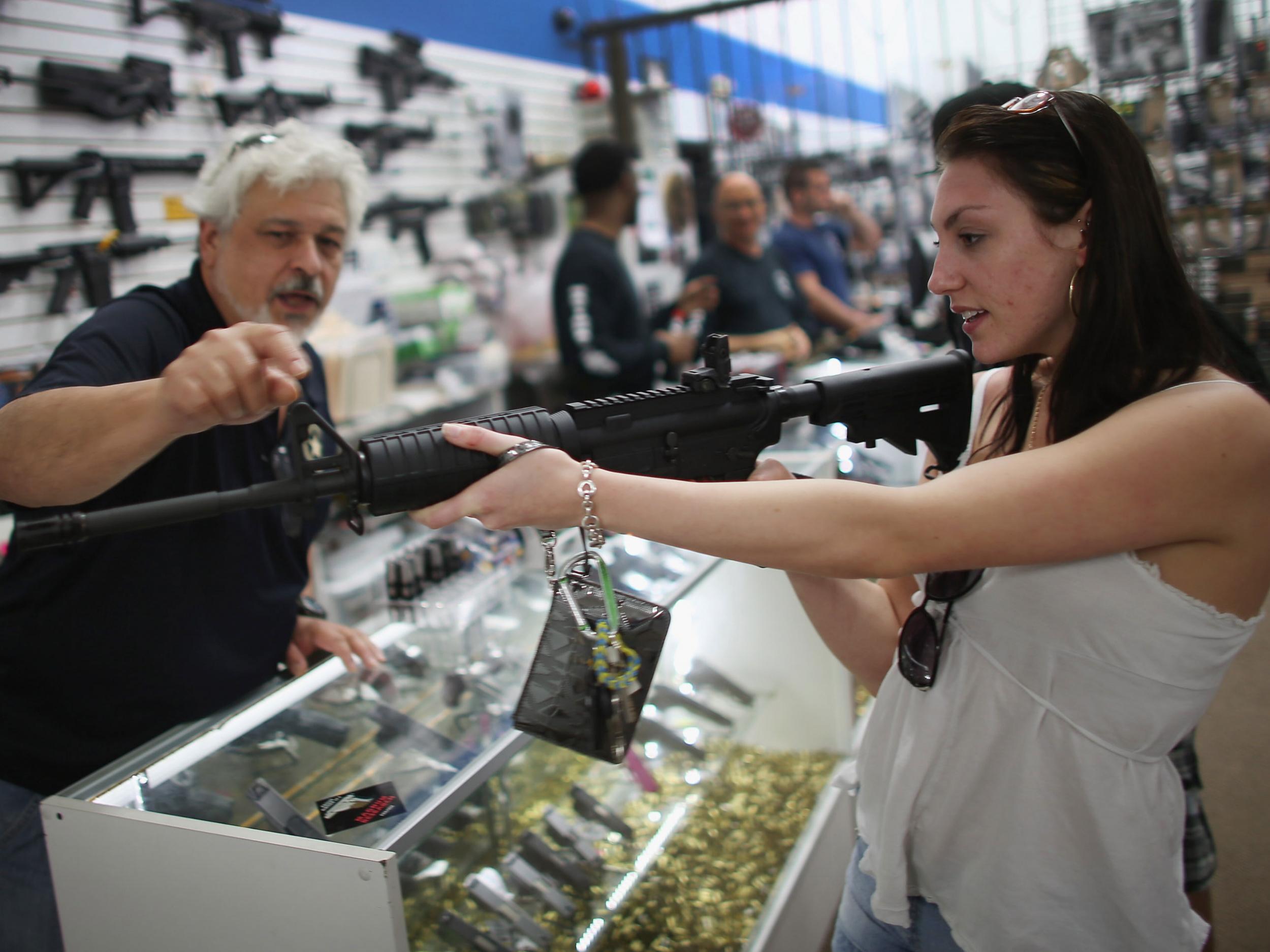Guns killing the same number of people as cars in the US
One in 10,000 people in the US are killed by guns

Your support helps us to tell the story
This election is still a dead heat, according to most polls. In a fight with such wafer-thin margins, we need reporters on the ground talking to the people Trump and Harris are courting. Your support allows us to keep sending journalists to the story.
The Independent is trusted by 27 million Americans from across the entire political spectrum every month. Unlike many other quality news outlets, we choose not to lock you out of our reporting and analysis with paywalls. But quality journalism must still be paid for.
Help us keep bring these critical stories to light. Your support makes all the difference.
For the first time in more than 60 years, firearms and automobiles are killing Americans at an identical rate, according to new mortality data released this month by the Centers for Disease Control and Prevention (CDC). In 2014, the age-adjusted death rate for both firearms (including homicides, suicides and accidental deaths) and motor vehicle events (car crashes, collisions between cars and pedestrians, etc) stood at 10.3 deaths per 100,000 people.
The convergence of the trend lines above is driven primarily by a sharp drop in the rate of motor vehicle fatalities since 1950. In the late 1960s, for instance, there were well over 25 motor vehicle deaths for every 100,000 people in the United States. Since then, that rate has fallen by more than half.
Over the same period, gun deaths rose, but by a considerably smaller amount. Gun homicide rates have actually fallen in recent years, but those gains have been offset by rising gun suicide rates. Today, suicides account for roughly two out of every three gun deaths.
One way of illustrating the shift in gun and auto deaths is to look at state-level data. In 20o5, gun deaths outnumbered vehicle deaths in just two states, Alaska and Maryland, plus the District of Columbia. By 2014, gun deaths were greater in 21 states plus D.C.
Medical ailments, such as cancer and heart attacks, kill considerably more people each year than either guns or automobiles, according to the CDC. But firearms and motor vehicles are among the leading non-medical causes of mortality in the United States. They kill more people than falls do each year, and considerably more people than alcohol.
The steady decline in motor vehicle deaths over the past 65 years can be attributed to a combination of improved technology and smarter regulation. The federal government mandated the presence of seat belts in the 1960s. The '70s brought anti-lock brakes. The '80s brought an increased focus on drunk driving and mandatory seat belt use. Airbags came along in the '90s. More recent years have seen mandates on electronic stability systems, increasedpenalties for distracted driving and forthcoming requirements for rear-view cameras.
The result has been safer cars, safer roads, better drivers and a decades-long decline in motor vehicle fatalities, according to the Insurance Institute for Highway Safety.
By contrast, the history of American gun control regulation has been more erratic. Restrictions passed in earlier eras, such as the assault weapons ban, have been undone recently. During the George W. Bush administration, Congress passed laws that prohibited law enforcement from publicizing data showing where criminals obtained their guns and granted gunmakers immunity from some civil lawsuits.
Technological advances, like smart-gun technology that prevents people other than the owner from firing a gun, have been stymied by opposition from the National Rifle Association and from many gun owners. Modest regulatory changes, including universal background checks, enjoy overwhelming support from gun owners and the American public. But those, too, have been thwarted under pressure from gun-rights advocates and the NRA.
The result? A gun mortality rate that's slightly higher than where it stood 50 years ago. Particularly vexing is that there may be ways to improve gun safety and reduce firearm deaths -- particularly suicides -- that haven't even been thought of yet. But innovations in gun safety are hard to come by, in large part because of Congress's longstanding ban on many types of federal gun research.
The ban has a chilling effect not only on federal agencies like the CDC but also on academic researchers, such as Harvard's David Hemenway. One well-known researcher, Garen Wintemute of the University of California at Davis, had to donate $1 million of his own money to keep his research going.
Firearms kill roughly 30,000 people a year. But Wintemute estimates that there are only a dozen full-time gun violence researchers in the United States. “There’s so many things we’d like to do,” Hemenway told the Trace earlier this year. “Just pick a topic, and we’d like to know more about it, from things like open carry to gun training to gun storage to gun theft to straw purchasers.” But he explicitly tells his students not to join the field because of the severe difficulties that researchers face in obtaining funding and publishing their results.
Gun deaths and vehicle deaths are in many ways two different problems. Gun deaths are typically intentional -- people deliberately kill either themselves or someone else. Motor vehicle deaths, by contrast, are usually accidental. And cars are much more complicated machines than guns, with a lot more components and systems to iterate and improve upon.
Still, we've been able to make driving much safer thanks to a combination of smart regulation technological innovation. We could potentially do the same with guns.
Copyright: Washington Post
Subscribe to Independent Premium to bookmark this article
Want to bookmark your favourite articles and stories to read or reference later? Start your Independent Premium subscription today.
Join our commenting forum
Join thought-provoking conversations, follow other Independent readers and see their replies
Comments